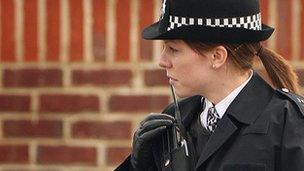Social media benefits to police investigated
- Published

If the police do not have an official social media presence, unauthorised channels will spring up in their place, the report says.
Police forces with strong social media presences have better relationships with the citizens they are policing, researchers claim.
Their study involved several European countries.
They found that in countries where the police social media presence was less strong, "unofficial" pages were popular.
One Facebook page containing news about the police in Berlin had 15,000 members, the report said.
The research project is part of the work of a group called Composite (Comparative Police Studies In The EU).
The team interviewed police IT professionals in 13 European countries including the UK, Belgium, Germany, the Netherlands and Spain.
"Police work in general and specific incidents are discussed in the social media anyway," said project co-ordinator Dr Sebastian Denef, from the Fraunhofer Institute for Applied Information Technology .
"Therefore, the question is not whether the social media are appropriate for police topics, but how the police forces get involved and reap the benefits. If the police is not active, others fill the void."
Police need to engage with people via social media not just to chase investigation leads, the report suggests.
Reaching young
"As our analysis of the UK riots in the summer of 2011 clearly indicates, during times of crises police forces highly benefit from established connections and trained practices on social media," it reads.
"The voice of the police on social media receives a high level of trust that supersedes bogus information distributed online."
Social media is also more effective than traditional print media for communicating with young people, the report adds.
"Younger people.... simply do not subscribe to local newspapers any longer and often get their news solely via social media," it says.
Social media also enables the police to display a more "human side" because of the more informal tone adopted in networks like Twitter and Facebook according to the Composite team.
"Social media not only calls for a different tone, it also allows police officers to talk about positive news, emotions, police culture and experiences of daily life," the study says.
"As a result the public describes and welcomes the police as a human organisation that can be trusted."
The Association of Chief Police Officers (ACPO) said that the platforms were very much part of modern policing in the UK.
"All forces are engaged in social networking to some degree because it opens up a two way conversation with the public," said Chief Constable Gordon Scobbie from ACPO.
"Social media use is likely to continue to grow and, on balance, the advantages of social media use by the police outweigh the disadvantages."
- Published3 December 2012
- Published3 December 2012